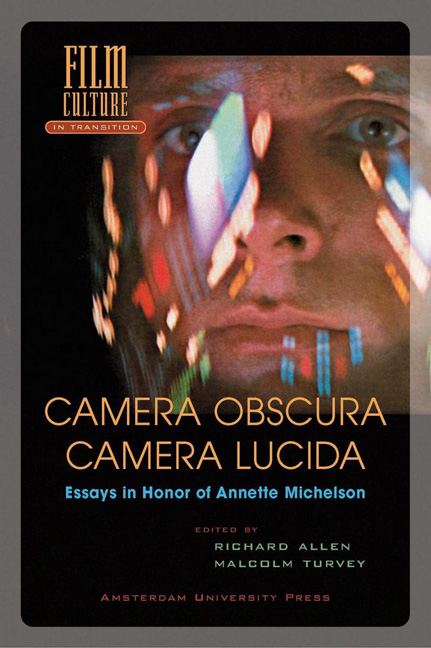Book contents
- Frontmatter
- Contents
- Acknowledgements
- Preface
- Introduction
- The Logic of an Illusion: Notes on the Genealogy of Intellectual Cinema
- Narcissistic Machines and Erotic Prostheses
- Loïe Fuller and the Art of Motion: Body, Light, Electricity and the Origins of Cinema
- Visitings of Awful Promise: The Cinema Seen from Etna
- Transfiguring the Urban Gray: László Moholy-Nagy’s Film Scenario ‘Dynamic of the Metropolis’
- Eisenstein’s Philosophy of Film
- Knight’s Moves
- Hitchcock and Narrative Suspense: Theory and Practice
- From the Air: A Genealogy of Antonioni’s Modernism
- Dr. Strangelove: or: the Apparatus of Nuclear Warfare
- Collection and Recollection: On Film Itineraries and Museum Walks
- Afterward: A Matter of Time: Analog Versus Digital, the Perennial Question of Shifting Technology and Its Implications for an Experimental Filmmaker’s Odyssey
- Select Bibliography
- List of Contributors
- Index
- Film Culture in Transition General Editor: Thomas Elsaesser
Hitchcock and Narrative Suspense: Theory and Practice
Published online by Cambridge University Press: 25 January 2021
- Frontmatter
- Contents
- Acknowledgements
- Preface
- Introduction
- The Logic of an Illusion: Notes on the Genealogy of Intellectual Cinema
- Narcissistic Machines and Erotic Prostheses
- Loïe Fuller and the Art of Motion: Body, Light, Electricity and the Origins of Cinema
- Visitings of Awful Promise: The Cinema Seen from Etna
- Transfiguring the Urban Gray: László Moholy-Nagy’s Film Scenario ‘Dynamic of the Metropolis’
- Eisenstein’s Philosophy of Film
- Knight’s Moves
- Hitchcock and Narrative Suspense: Theory and Practice
- From the Air: A Genealogy of Antonioni’s Modernism
- Dr. Strangelove: or: the Apparatus of Nuclear Warfare
- Collection and Recollection: On Film Itineraries and Museum Walks
- Afterward: A Matter of Time: Analog Versus Digital, the Perennial Question of Shifting Technology and Its Implications for an Experimental Filmmaker’s Odyssey
- Select Bibliography
- List of Contributors
- Index
- Film Culture in Transition General Editor: Thomas Elsaesser
Summary
Suspense is a paradigmatic instance of the manner in which a spectator's emotional responses to narrative can be manipulated, and Hitchcock's skill as a film director has long been identified with his mastery of suspense. Narrative suspense develops out of a basic and pervasive feature of storytelling – the manner in which stories sustain our interest by encouraging us to anticipate what happens next. However, narrative suspense is more than simply a question of anticipating what happens next; it involves the generation of a state of anxious uncertainty about what happens next. How is this anxious uncertainty engendered? Noël Carroll argues that this state of anxious uncertainty is created in a narrative where the question ‘what happens next?’ is dramatized through the representation of two alternate narrative outcomes of a specific kind. One is a moral outcome and hence, conventionally speaking, desirable, yet it is unlikely. The other is an immoral outcome that is conventionally undesirable, yet it is likely to happen. For example, in D.W. Griffith's THE LONELY VILLA (1909), villains pin down the heroine in her isolated house.Will the absent hero rescue her before they overpower her? It seems unlikely. On the one hand, the villains are nearby and she seems defenseless; on the other, the hero is a long way off and does not know what is going on. How is the hero going to get back in time to rescue the heroine? Carroll puts forward his theory of suspense in explicit contrast to the theory offered by Roland Barthes and, in a slightly different form, by François Truffaut in his interview with Hitchcock. Both Barthes and Truffaut argue that suspense is essentially generated through the fact that we do not know the nature of the narrative outcome whose resolution is deferred or delayed, and it is this ‘suspension’ of the narrative outcome that causes suspense. In this paper, I shall argue through an investigation of Hitchcock's theory and practice of suspense that Carroll's theory of suspense requires a two-fold qualification. Hitchcock's practice not only calls into question the moral underpinnings of Carroll's definition of suspense, as Carroll himself recognizes, but also Hitchcock's theory and practice of suspense require us to reconsider the theory of suspense as narrative deferral or delay that is rejected by him.
- Type
- Chapter
- Information
- Camera Obscura, Camera LucidaEssays in Honor of Annette Michelson, pp. 163 - 182Publisher: Amsterdam University PressPrint publication year: 2003



